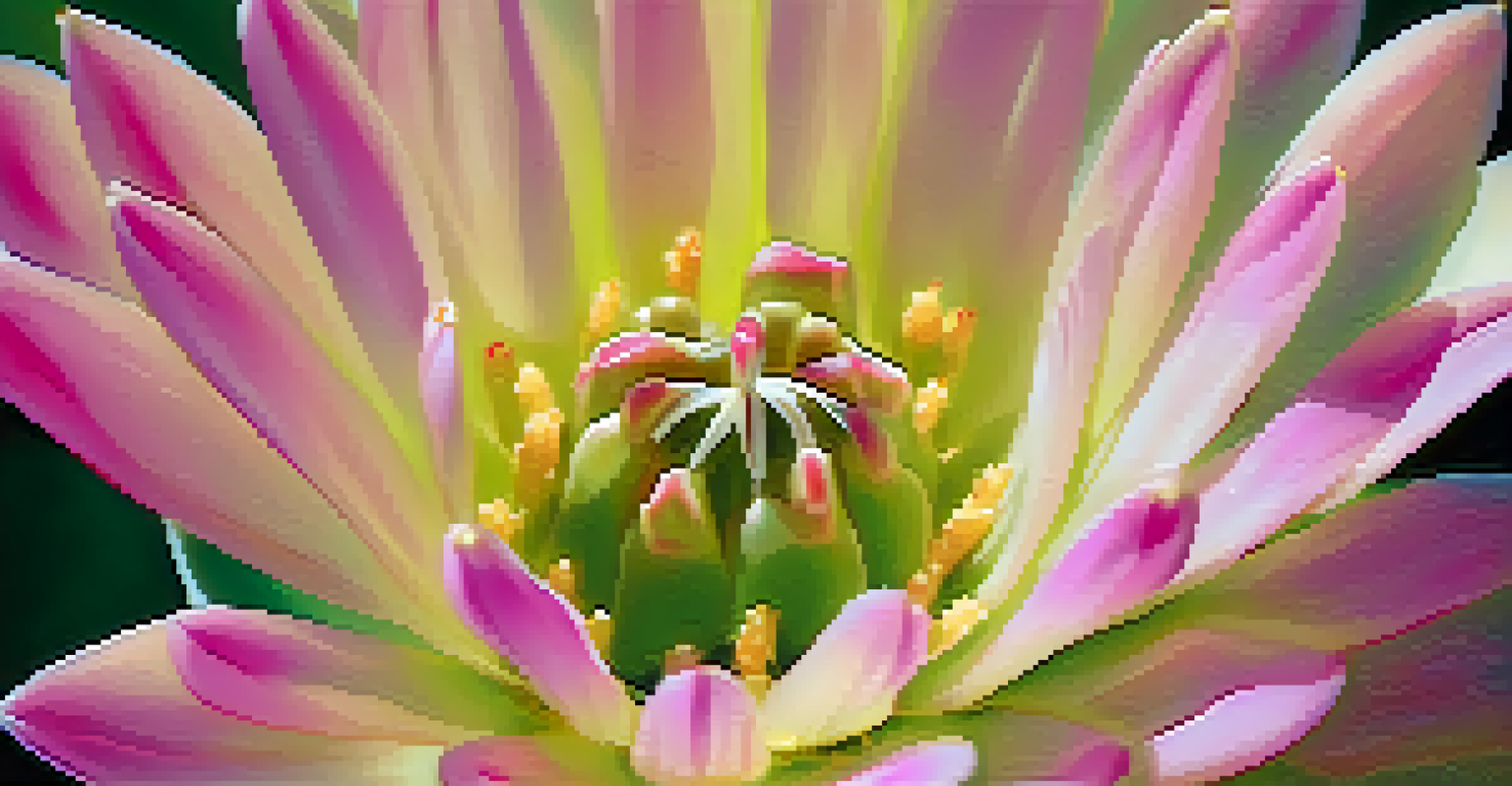Exploring Peyote's Role in Traditional Native American Ceremonies

Understanding Peyote: A Sacred Plant in Native Culture
Peyote, a small cactus native to the southwestern United States, holds profound significance in many Native American cultures. For centuries, indigenous tribes have revered it not just for its psychoactive properties but also for its spiritual benefits. This sacred plant is often associated with healing, vision quests, and deepening one's connection to the spiritual world.
The plant symbolizes resilience, identity, and the ongoing connection to ancestral traditions.
Traditionally, Peyote is consumed during ceremonial gatherings, where it facilitates introspection and communal bonding. It’s important to note that its use is rooted in a deep respect for nature and the spiritual realm, contrasting sharply with recreational drug use. This distinction emphasizes the cultural and spiritual context in which Peyote is utilized.
Understanding the role of Peyote in these cultures requires acknowledging the historical struggles of Native peoples. For many, Peyote represents resistance against colonial oppression and a reclaiming of cultural identity, making its ceremonial use a powerful act of affirmation.
Ceremonial Use of Peyote in Native American Traditions
Peyote ceremonies, often referred to as 'Peyote meetings,' are central to the religious practices of several tribes, including the Huichol, Lakota, and Navajo. These gatherings typically involve singing, drumming, and storytelling, creating a vibrant atmosphere of communal support. Participants seek guidance, healing, and a deeper understanding of their place in the universe.

The ceremonies usually last all night and can include various rituals, with Peyote serving as a catalyst for spiritual visions and insights. Many participants report experiencing profound feelings of unity with nature and the cosmos, which can lead to transformative personal revelations. This shared experience reinforces communal bonds and fosters a sense of belonging.
Peyote's Cultural Significance
Peyote symbolizes resilience and identity for many Native Americans, serving as a reminder of their ancestral traditions and struggles.
Importantly, the use of Peyote in these settings is often governed by strict protocols. Participants enter with a mindset of respect, often fasting beforehand to prepare themselves spiritually. This preparation underscores the sacredness of the experience and the importance of entering the ceremony with a clear heart and mind.
The Spiritual Journey: Insights Gained from Peyote
Many participants of Peyote ceremonies describe their experiences as journeys into the depths of their consciousness. These journeys can reveal personal truths, ancestral wisdom, and insights about one's life path. Through the altered state induced by Peyote, individuals may confront fears, find clarity about their relationships, or even connect with departed loved ones.
Through this lens, Peyote becomes a teacher, illustrating the importance of living in harmony with nature.
Anecdotes abound about individuals gaining a renewed sense of purpose or healing from trauma following a Peyote ceremony. These insights often transcend the individual, impacting their community and family as they share their experiences and newfound wisdom. This ripple effect highlights the interconnectedness of individual and communal healing.
However, it’s essential to approach these experiences with caution and respect. Peyote can evoke intense emotions, and not everyone may be prepared for the depth of introspection it can bring. This underscores the importance of participating in these ceremonies under the guidance of experienced elders who can offer support and interpretation.
Cultural Significance of Peyote Beyond the Ceremony
While Peyote's role in ceremonies is well-documented, its cultural significance extends far beyond these events. The plant symbolizes resilience, identity, and the ongoing connection to ancestral traditions. For many Native Americans, Peyote serves as a reminder of their history, struggles, and the importance of maintaining their cultural practices.
Moreover, Peyote has become a symbol of spiritual sovereignty, as various tribes advocate for their right to use it in their religious practices. This fight for recognition and respect is a crucial aspect of indigenous rights movements, making Peyote more than just a plant; it embodies a struggle for cultural survival.
Ceremonial Use and Spiritual Insights
Peyote ceremonies facilitate profound spiritual journeys that foster personal revelations and strengthen communal bonds among participants.
In this context, the ongoing dialogue surrounding Peyote use also reflects broader societal issues, including the need for cultural sensitivity and respect for indigenous practices. Recognizing Peyote’s place in the fabric of Native American identity fosters greater understanding and appreciation for these rich traditions.
Legal Challenges and the Future of Peyote Use
The use of Peyote has faced significant legal challenges, particularly in the United States. Although some religious groups have gained legal protections for its use, ongoing debates about drug policies often overshadow these rights. Many advocates argue that the legal framework surrounding Peyote needs to be reevaluated to respect indigenous practices fully.
These discussions emphasize the importance of balancing the law with cultural traditions. Advocates for Peyote use stress that its consumption is intertwined with spiritual beliefs and should not be treated like recreational drugs. By understanding this context, lawmakers can better appreciate the needs and values of indigenous communities.
Looking forward, the future of Peyote use will likely depend on continued advocacy and education about its cultural significance. As more people learn about the importance of Peyote in Native American traditions, there may be greater support for legal reforms that honor these practices and the rights of indigenous peoples.
Connecting with Nature: Lessons from Peyote Practices
One of the essential lessons from Peyote practices is the deep connection to nature that many Native American cultures emphasize. Peyote ceremonies often take place in natural settings, reminding participants of the sacredness of the earth and their responsibility to protect it. This connection fosters a sense of stewardship, encouraging individuals to honor the land and all living beings.
Moreover, the rituals surrounding Peyote use often incorporate elements from the natural world, such as plants, animals, and celestial bodies. This interconnectedness highlights the belief that everything in the universe is linked, reinforcing the idea that human actions impact the broader ecosystem. Through this lens, Peyote becomes a teacher, illustrating the importance of living in harmony with nature.
Legal Challenges for Peyote Use
Ongoing legal debates highlight the need to respect indigenous practices regarding Peyote, as advocates push for recognition of its spiritual significance.
As society grapples with environmental issues, the lessons learned from Peyote practices can inspire a more holistic approach to ecology. By embracing the principles of respect, gratitude, and interconnectedness, individuals can contribute to a more sustainable future, echoing the teachings of indigenous cultures.
Final Thoughts: Reverence for Peyote in Modern Context
In conclusion, Peyote's role in traditional Native American ceremonies is a testament to its profound spiritual significance. It serves as a bridge between the physical and spiritual worlds, offering insights and healing to those who partake in its ceremonies. As we explore these traditions, it’s crucial to approach them with respect, recognizing the rich cultural heritage they represent.
Furthermore, engaging with these practices encourages a broader understanding of indigenous rights, spirituality, and the importance of preserving cultural traditions. By fostering dialogue and respect, we can honor the legacies of those who have used Peyote for generations and ensure these practices continue to thrive.

Ultimately, Peyote is more than just a plant; it is a symbol of resilience, community, and the ongoing journey toward spiritual understanding. As we navigate the complexities of modern life, the lessons offered by Peyote and the traditions surrounding it can inspire us all to seek deeper connections within ourselves and with the world around us.